On Friday a group gathered outside Greenwich Town Hall to mark the annual Stand Against Racism, a signature event of YWCAs across the country. This year marked the 15th year of the event, which raises awareness of all forms of racism.
At the event, Greenwich Schools superintendent Dr. Toni Jones presented four Gender and Racial Justice Scholarship Awards to local students who have shown commitment and accomplishment in moving their communities to a more inclusive and anti-racist future.
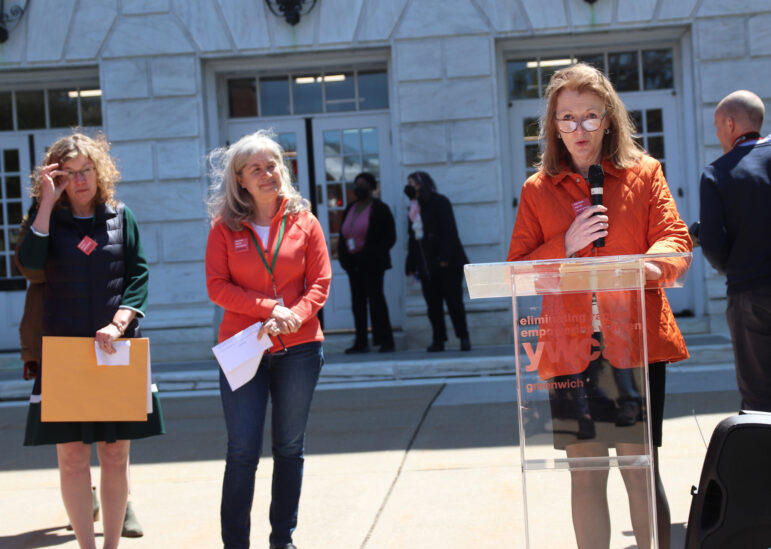
“Many in our community are most familiar with one type of racism, which is interpersonal racism. Acts of discrimination or violence by one individual to another,” said YWCA CEO Mary Lee Kiernan.
She said that in 2020, the first year of the pandemic, hate crimes reached the highest level since 2008, and here in Connecticut, from 2019-2020, hate crimes increased 32%, versus 6% across the rest of the country.
Kiernan said the motivation for hate crimes was overwhelmingly about race, ethnicity or ancestry, sexual orientation and religion.
“These are only incidents that are reported to police,” she said. “We know that just like domestic violence, these incidents are under reported and the true numbers are much higher.”
“Other types of racism, such as institutional and systemic racism, continue to disadvantage these very same groups, resulting in generations of disparate outcomes, in systems such as education, healthcare, housing and employment,” Kiernan said.
“Covid laid bare the very profound disparities in health outcomes for people of color,” she continued. “One study that controlled for age found that Hispanic, Black and indigenous peoples are twice as likely to die from Covid-19 than white people.”
Kiernan talked about how outcomes are driven by disparities including in neighborhoods, and physical environmental, such as housing, environmental pollution, access to transportation, lack of access to quality healthcare, and working in settings where there is more exposure to illness.
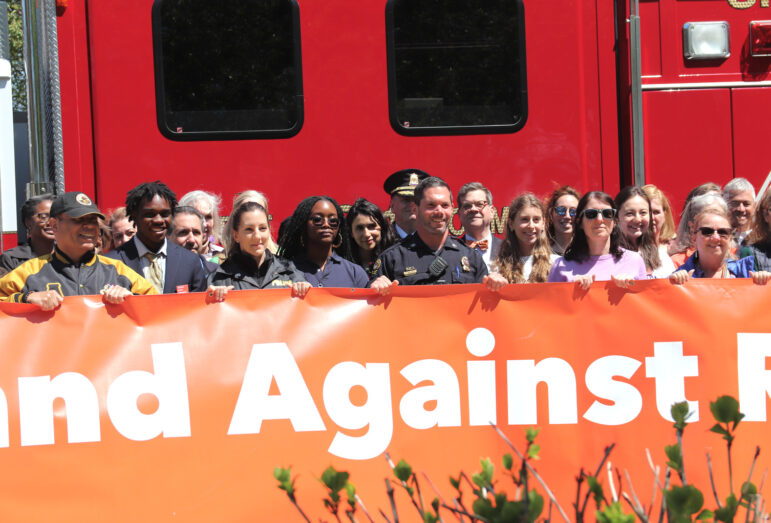
Selectwomen Lauren Rabin and Janet Stone McGuigan read a proclaimed that designated Friday as Stand Against Racism Day and shared a proclamation from the First Selectman that read, in part:
“Whereas we recognize structural racism plays a large role in determining the conditions in which people are born, grow, work, live and age. These factors affect people’s access to quality housing, education, food, transportation, political power and other social determinants of health.”
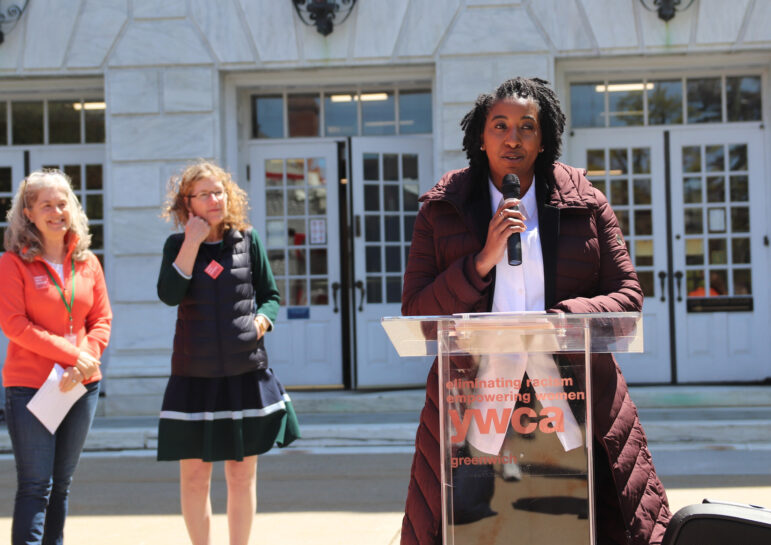
Erin Crosby noted that Thursday was Holocaust Remembrance Day.
“While there were many lessons we should have learned from the horrors of the Holocaust, I hope one lesson is that we cannot ignore, hesitate, or negotiate with notions of dominance or supremacy,” she said, adding that racism was more than individual acts of meanness and violence.
“One reason racism remains powerful is it is embedded in our culture and social institutions and upheld each and every time we fail to see it fail, fail to acknowledge it, fail to disrupt it or fail to be anti-racist,” Crosby said. “My hope today is the the Stand Against Racism is more than a moment in time, more than a photo.”
Crosby said people often ask where they can start to make a difference in eliminating and dismantling racism.
She suggested reflecting continuously about both overt and covert messages rooted in notions of superiority, inferiority and racism.
“Acknowledge that racism is not first and foremost about hate,” she said. “It’s about self-interest. Hate is a byproduct. Educate yourself on racial justice issues and share what you learn with your community, even if it means challenging your family, your partner, your children, your friends, your employer, those you volunteer with and those you encounter on a daily basis.”
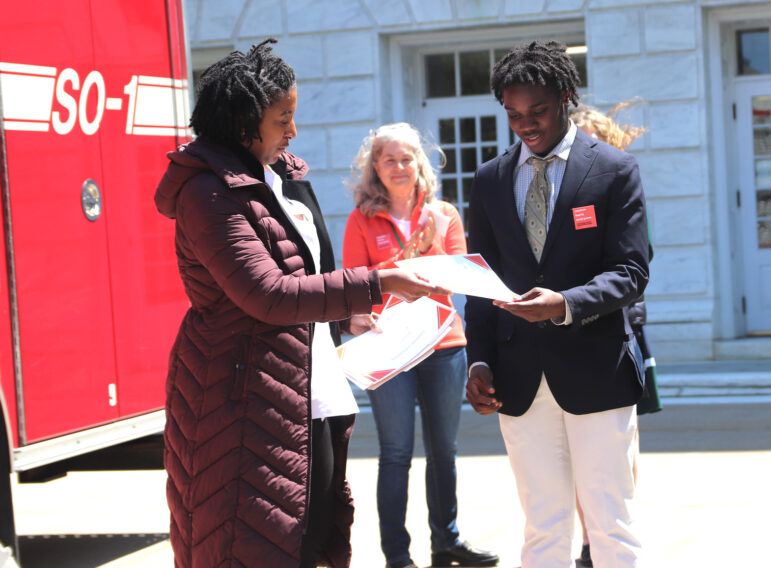
Dr. Toni Jones, superintendent of Greenwich Public Schools presented the 2022 Gender and Racial Justice Scholarships.
Caleb Boateng, a senior at Brunswick School was honored for his work over the past four years in the school’s Diversity in Action Club. He has also partnered with Greenwich Academy, GHS and other local schools on workshops and conversations to elevate the consciousness of students and faculty about gender and racial justice.
After George Floyd’s murder Caleb created an opportunity for students to express both outrage and hope for a better society.
He also created platforms for discussion following attacks on members of the gay and transgender community.

Kayla Ferjuste, a senior from Greenwich Academy, is the vice president of Black Students United. She served for three years as an elected member of the student government’s Diversity Equity & Inclusion board, organizing monthly roundtable discussions on topics including cultural appropriation and colorism, which is a form of discrimination, typically within a racial or ethnic group, favoring people with lighter skin over those with darker skin.
“She has done a terrific job of energizing students and creating a space where they can unburden themselves at the door and celebrate their identities,” Dr. Jones said of Kayla. “So often, when students in predominantly white institutions talk about Black culture, it is in the context of struggle and oppression. Through her work Kayla has engaged the Greenwich Academy community’s reflection on Black pride and joy.”
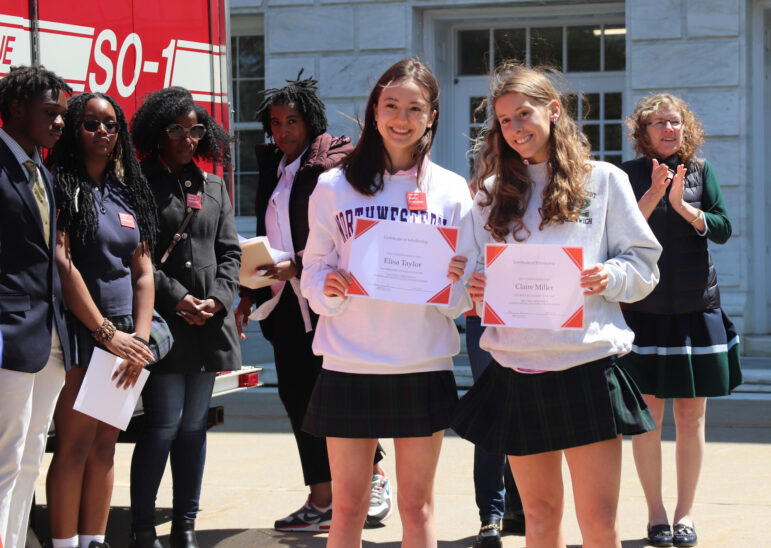
Two seniors at Sacred Heart Greenwich – Elisa Taylor and Claire Miller – received the YWCA’s first award presented to two students for joint efforts toward equity.
Elisa and Claire run the Diversity Club at their school, where this year they have been active in creating programming on important issues such as intersectional feminism, Native-American displacement and the importance of cultural sensitivity.
Not only did they help facilitate conferences, but they were instrumental in training student facilitators and creating opportunities for post-conference dialogue.